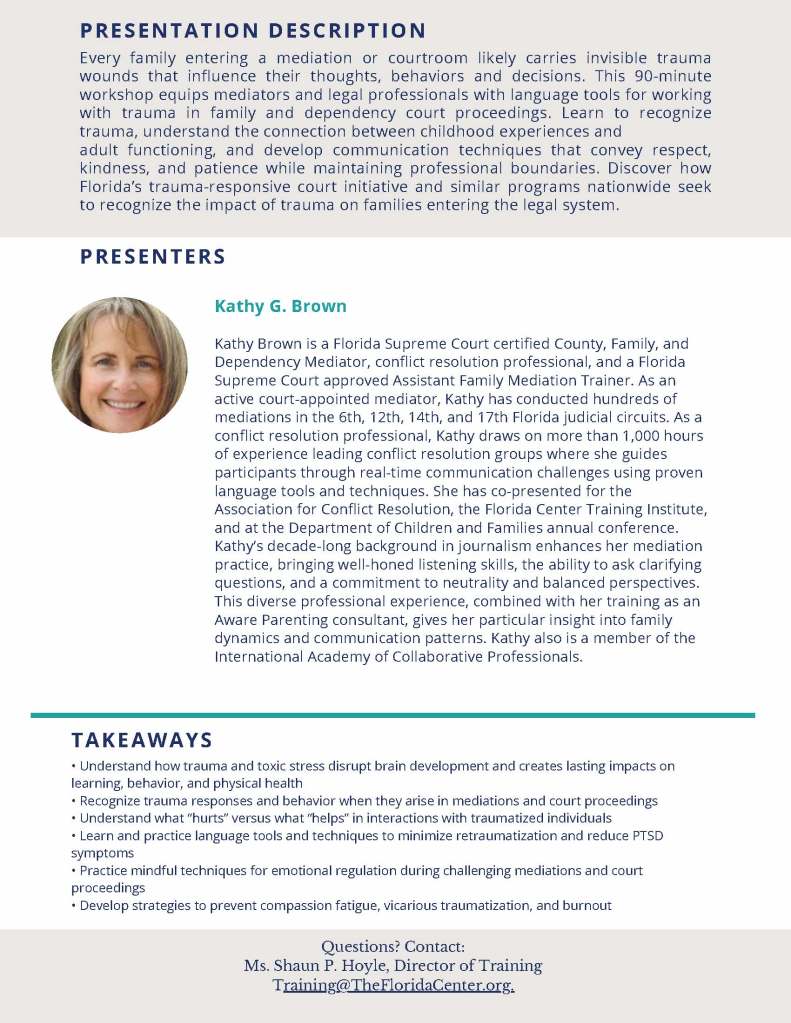During disputes, strong emotions can often derail the communication process and impair relationships by impacting how we communicate.
How we communicate during a conflict affects how the other party hears us. To resolve conflict, parties must feel heard so solutions can occur. Feeling heard is the function that moves us out of conflict and on to the path of resolution.
As a mediator, I use a “parts” language and framework as one of my main tools to help parties hear each other better. This method draws on our natural instinct to describe what’s going on inside us. And it offers a safe way to speak for intense emotions and to give voice to mixed feelings.
For example, in the course of any given day we may think or say, “Part of me feels this way, but part of me feels that way.” Or, “On the one hand, I like where we’re going with this, but on the other, I’m concerned we’re not addressing a key component.” Or, “Part of me wants to share my experience, but another part of me worries I’ll be embarrassed.”
In short, the tool helps the listener to not hear blame, because the framework helps the speaker phrase things in a way that opens up space for a more calm and curious view of the issues. When this happens, solutions often arise spontaneously.
Although some mediators might include this language as part of their skill set, many more can benefit from understanding how effective the framework is for both mediators and the parties we work with.
This language and framework is formalized in a tool called Internal Family Systems (IFS), a highly effective psychotherapy model that also helps to manage disagreements.
Using the IFS techniques, I help parties to identify and speak for the fearful, angry or wounded parts of themselves that are driving the conflict. Once these parts are witnessed, the parties often become more relaxed. And they’re more open to talking about the situation with a sense of genuine concern and curiosity.
The benefits of using IFS in mediations and negotiations became clear to me at a 2017 training I attended in Boston. It was led by attorney and mediator David Hoffman, and psychologist Dick Schwartz, the developer of the IFS model.
Hoffman is the founding member of the Boston Law Collaborative Institute, and Lecturer on Law at Harvard Law School. For more than 10 years, he has been using IFS techniques in his mediation and law practice. He says IFS has enhanced his ability to mediate cases. But, he adds, not all lawyers and mediators are enthusiastic about the tool. The ones who are tend to be more psychologically oriented.
“For most lawyers, psychology and emotional intelligence are not part of their standard training and therefore uncomfortable. Law, as it is currently practiced by most lawyers is a decidedly left-brain enterprise,” he says.
“For the lawyers and mediators drawn to IFS, I think the impetus is three-fold. First, there’s a recognition that we need to know what makes people tick to be effective. Second, IFS is a uniquely non-pathologizing, intuitive model that can be readily grasped without having a deep knowledge of psychoanalytic or psychodynamic theory. Finally, IFS provides mediators and lawyers with valuable tools for self-understanding, self-compassion and self-management.”
Mediating using the IFS model
Created by Schwartz in the 80s, IFS postulates that we are all made up of parts. This concept isn’t new. Freud stated that the mind consists of three parts: the id, the ego, and the superego, at the turn of the 20th century.
IFS takes the idea a little further. It contends that it’s the natural state of the mind to be divided into many parts or subpersonalities. The model asserts these “parts” have different thoughts, feelings and beliefs. And they interact with each other much like the interactions of family members.
Taking this approach to the mind can be very helpful. Hoffman elaborates on this in a 2011 article in the Harvard Negotiation Law Review. The article is titled, “Mediation, Multiple Minds, and Managing the Negotiation Within.”
“The concept of parts allows the mediator to inquire as to whether there are other parts with differing goals and agendas— thus providing the parties with a psychologically safer way to express the full range of emotions they may be experiencing — and to consider loosening their commitment to strongly held positions. This technique also provides the mediator and the parties with an easily understandable vocabulary for communicating about ambivalence.”
In IFS, “parts” fall into three categories or roles as a result of trauma. They are: Managers, Exiles, and Firefighters.
Managers are parts who protect a person from past pain or from being hurt by others. They take on roles such as an inner critic, a pleaser, an organizer, a judge or an intellectual.
Exiles are often young parts who have experienced pain, shame, fear or trauma. Usually these are from experiences that happened in childhood. But they’re still unresolved because there were no resources at the time for the young parts to heal.
The jobs of the managers and the firefighters are to prevent the pain of the exiles from coming to the surface. Because if that happens, a person’s system could become overwhelmed with emotional pain.
Firefighters are parts with extreme behaviors. They come on the scene when the managers have been unable to stop the exile from emerging. The firefighter parts work to numb, dissociate, or distract a person’s attention away from the hurt or shame of the exile. They’re often associated with addictive behaviors. Some of which are overeating, drug and alcohol abuse, violence, sex addiction, overworking or over-medicating.
Besides the three categories, the model contends that at our core is what IFS calls the Self. This Self is innate in all of us, and contains 8 characteristics, which IFS refers to as the 8 C’s. They are:
Calmness
Curiosity
Compassion
Courage
Clarity
Confidence
Connectedness
Creativity
These are all traits that can benefit a mediator in the midst of conflict.
As Hoffman and Schwartz state, when mediators are Self-led, it’s contagious. Coming from a more centered, open and curious place, mediators can then help the parties do the same.
Schwartz explains how lawyers and mediators can apply the IFS model to mediation.
“When people are in conflict, they are often hijacked by parts of them that see the other as trying to exploit, dominate, or hurt them. Consequently, they act in ways that trigger the protective parts of the other and things escalate,” he says.
“When a mediator can help each part find, listen to, and then ask their protectors to ‘step back’ inside, they access a very different aspect of the person who can see the other and the issue with qualities like clarity, confidence, calm and even compassion. IFS calls this state Self. When the mediator can hold each party in Self leadership, creative flexible solutions emerge naturally.”
It’s important to note the difference between IFS psychotherapy and IFS mediation. IFS therapy helps to release the Managers, Exiles, and Firefighters from their extreme roles so they can choose new ones that support a person’s emotional healing. IFS mediation employs a more limited use of the model. As Schwartz states, in IFS mediation, the goal is to help the parties’ protector parts step aside temporarily so the parties can be Self-led with characteristics such as curiosity and compassion.
I’ve found that often just having the triggered parts acknowledged and witnessed by others opens up space for Self to emerge, which has a profound effect on putting the parties on the path to resolution.
If you’re looking for a mediator and you’re interested in experiencing the IFS language and framework as part of the mediation process, please contact Kathy at relationshipconflictresolution@gmail.com to schedule a free consultation.










 become overloaded with stress hormones.
become overloaded with stress hormones. to show participants how to get in touch with their inner council’s feelings and needs, and how to tap into that place of calm, compassionate acceptance within us all.
to show participants how to get in touch with their inner council’s feelings and needs, and how to tap into that place of calm, compassionate acceptance within us all.